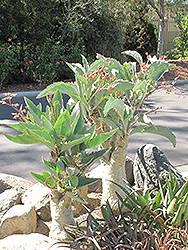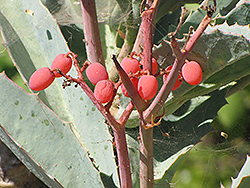It's all about ...
plants

Height: 6 feet
Spread: 4 feet
Sunlight:
![]()
![]()
Hardiness Zone: 9b
Other Names: Tree Grape, Namibian Grape, Cissus juttae
Description:
A slow growing deciduous succulent featuring swollen stems with peeling bark; large, fleshy gray-green leaves with toothed margins emerge red-purple in late spring, falling off in winter; showy pinkish-red, grape-like bunches in late summer are toxic
Ornamental Features
Wild Grape is primarily grown for its highly ornamental fruit. It produces abundant clusters of red grapes with pink overtones from late summer to early fall. It has attractive grayish green foliage with white undersides which emerges plum purple in spring. The large serrated pointy leaves are highly ornamental but do not develop any appreciable fall colour. The peeling gray bark is extremely showy and adds significant winter interest.
Landscape Attributes
Wild Grape is a multi-stemmed deciduous shrub with an upright spreading habit of growth. Its relatively coarse texture can be used to stand it apart from other landscape plants with finer foliage.
This shrub will require occasional maintenance and upkeep, and should never be pruned except to remove any dieback, as it tends not to take pruning well. Deer don't particularly care for this plant and will usually leave it alone in favor of tastier treats. It has no significant negative characteristics.
Wild Grape is recommended for the following landscape applications;
- Accent
- Rock/Alpine Gardens
- General Garden Use
- Container Planting
Planting & Growing
Wild Grape will grow to be about 6 feet tall at maturity, with a spread of 4 feet. It has a low canopy with a typical clearance of 1 foot from the ground, and is suitable for planting under power lines. It grows at a slow rate, and under ideal conditions can be expected to live for approximately 20 years.
This shrub does best in full sun to partial shade. It is very adaptable to both dry and moist growing conditions, but will not tolerate any standing water. It is considered to be drought-tolerant, and thus makes an ideal choice for xeriscaping or the moisture-conserving landscape. It is not particular as to soil type or pH. It is somewhat tolerant of urban pollution. This species is not originally from North America, and parts of it are known to be toxic to humans and animals, so care should be exercised in planting it around children and pets.
Wild Grape makes a fine choice for the outdoor landscape, but it is also well-suited for use in outdoor pots and containers. With its upright habit of growth, it is best suited for use as a 'thriller' in the 'spiller-thriller-filler' container combination; plant it near the center of the pot, surrounded by smaller plants and those that spill over the edges. It is even sizeable enough that it can be grown alone in a suitable container. Note that when grown in a container, it may not perform exactly as indicated on the tag - this is to be expected. Also note that when growing plants in outdoor containers and baskets, they may require more frequent waterings than they would in the yard or garden. Be aware that in our climate, most plants cannot be expected to survive the winter if left in containers outdoors, and this plant is no exception. Contact our experts for more information on how to protect it over the winter months.
This plant is not reliably hardy in our region, and certain restrictions may apply; contact the store for more information.

